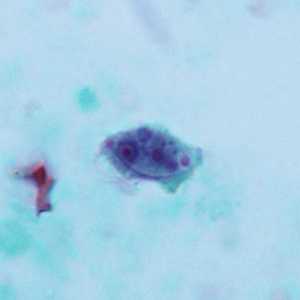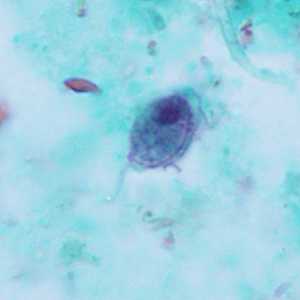
Case #322 - April, 2012
A 28-year-old man presented to his health care provider with intermittent diarrhea, mild abdominal cramping, and low-grade fever. Travel history included camping in the northwestern United States. Stool specimens were collected in formalin and polyvinyl alcohol (PVA) and sent to a commercial lab for ova-and-parasite (O&P) examination. Figures A and B show what was observed in moderate frequency on a trichrome-stained smear made from the PVA-preserved stool. The objects of interest measured 12-15 micrometers on average in length. The images were captured at 1000x magnification. What is your diagnosis? Based on what criteria?

Figure A

Figure B
Case Answer
This case showed the nonpathogenic flagellate, Pentatrichomonas hominis. Diagnostic features shown included:
- trophozoites within the size range for P. hominis (6-20 micrometers long).
- trophozoites containing a single nucleus with a small karyosome and a posteriorly-directed axostyle.
- presence of flagella; although P. hominis has five flagella, few, if any, are generally seen on stained smears.
More on: Pentatrichomonas hominis
Images presented in the monthly case studies are from specimens submitted for diagnosis or archiving. On rare occasions, clinical histories given may be partly fictitious.
DPDx is an education resource designed for health professionals and laboratory scientists. For an overview including prevention and control visit www.cdc.gov/parasites/.
- Page last reviewed: August 24, 2016
- Page last updated: August 24, 2016
- Content source:
- Global Health – Division of Parasitic Diseases and Malaria
- Notice: Linking to a non-federal site does not constitute an endorsement by HHS, CDC or any of its employees of the sponsors or the information and products presented on the site.
- Maintained By:


 ShareCompartir
ShareCompartir